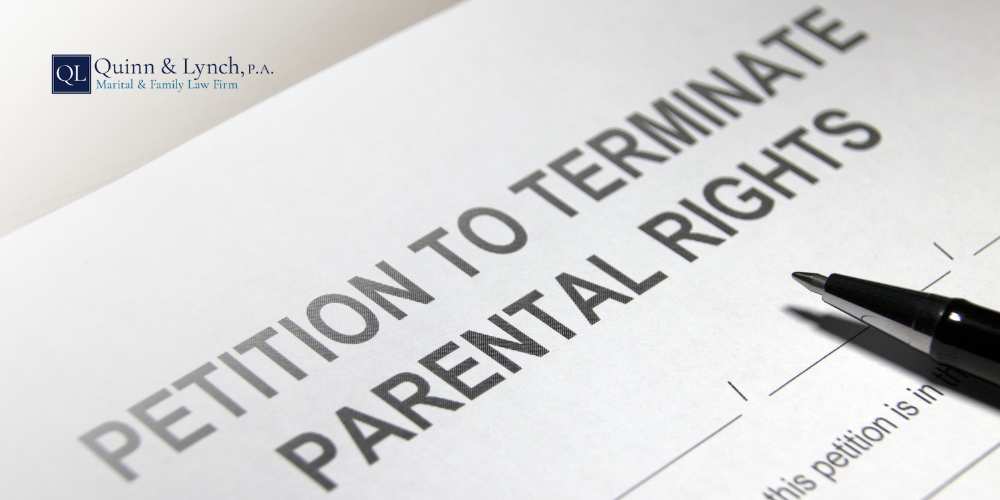The decision to sign over parental rights is not taken lightly in Florida. This legal process is a very serious matter, requiring the approval of a court before a parent has his or her parental rights terminated. Signing over parental rights in Florida involves a judge closely examining the circumstances surrounding the parental rights case to ensure that the termination of these rights serves the best interests of the child involved.
For parents facing the complexity of having their parental rights case heard before a court, it’s crucial to have trustworthy legal guidance. The Tampa divorce & family law attorneys at Quinn & Lynch are experienced in handling the process of terminating parental rights.
If you’re dealing with a parental rights issue, don’t hesitate to call us at 813-223-7739 or contact us online to schedule a consultation.
What are Parental Rights?

Parental rights refer to the legal relationship between a parent and their child, encompassing the rights and responsibilities to make decisions about the child’s upbringing, education, medical care, and welfare. In a parental rights case, the parent’s parental rights are scrutinized, especially when decisions are being made about where the child lives, whether they are placed in foster care, or if they become eligible for adoption.
This legal concept is fundamental in determining how a child is raised, who is legally recognized as their parent, and how that relationship affects the child’s development and future. There are specific protections for stay-at-home-mom divorce rights and fathers’ rights in Florida related to parental rights.
Who Can Terminate a Parent’s Rights in Florida?
In Florida, the termination of parental rights can only be enacted through a court order, following a legal process outlined by state law. A petition to terminate parental rights can be filed by a guardian, a state agency, or, in some cases, an individual with a vested interest in the child’s welfare.
The decision to terminate is made by a judge, who carefully evaluates if such a step is best for the child, considering the child’s safety, health, and emotional well-being above all.
Voluntary Termination of Parental Rights in Florida
The voluntary termination of parental rights in Florida occurs when a parent decides to relinquish their rights and responsibilities towards their child legally. This significant decision is typically made with the best interests of children in mind, whether to allow the child to be adopted or placed in foster care with foster parents who can provide a stable, nurturing environment.
For a parent to voluntarily terminate their rights, they must petition the court, clearly stating their intention and understanding of the consequences and forfeiting any visitation rights.
When a parent voluntarily terminates their parental rights, they are no longer held to the financial obligation of paying child support. While the freedom to stop paying child support might seem like a relief to some, the core reason behind voluntary termination should always focus on what is best for the children.
Adoption often follows the termination of parental rights, opening a path for children to become legally integrated into a new family that can offer them a loving and secure home.
Can I Give Up My Rights If I Don’t Want a Parent-Child Relationship in Florida?
In Florida, voluntarily terminating parental rights to end a parent-child relationship is legally possible but is subject to strict conditions and the court’s approval.
This legal process allows a parent to voluntarily relinquish their rights, usually when it is better for the child, such as in cases leading to adoption. However, the court will consider the implications for the child, including the loss of financial support and the effect on the other parent’s parental rights.
It’s important to understand that voluntarily terminating parental rights is not simply a means to avoid obligations; there must be valid grounds for the termination that align with the child’s welfare and legal requirements set by state law.
Involuntary Termination of Parental Rights in Florida

Involuntary termination of parental rights is a severe measure taken when a court determines that continuing the legal relationship between a parent and their child is not in the child’s best interests. Grounds for such termination can include instances of sexual assault, criminal acts that endanger the welfare of the child, or a persistent failure to fulfill financial obligations, such as paying child support.
During a court hearing, the judge will review convincing evidence presented against one or both parents to decide whether to terminate parental rights involuntarily.
Reasons for Parental Rights Termination
Terminating a parent’s rights to their child is a serious legal action taken when it is believed that doing so is in the best interest of the child.
A termination case can be initiated through a petition to the court, where a judge will decide if the parent no longer deserves to have legal rights over the child due to circumstances that jeopardize the child’s welfare or safety. Common reasons for terminating parental rights include instances of sexual assault, severe neglect, or other criminal acts committed by the parent.
A Tampa family violence lawyer can help to ensure that the decision to sever the legal ties between a parent and child is made with the utmost consideration for the child’s safety, well-being, and future.
How Long Does a Parent Have to Be Absent to Lose Rights in Florida?
In Florida, the absence of a parent for a significant period can lead to the involuntary termination of parental rights, especially if this absence is coupled with a failure to communicate with the child or to comply with a child support order.
While Florida law does not specify an exact duration or reasonable time of absence that automatically results in the termination of a parent’s rights, a prolonged absence without fulfilling parental responsibilities or supporting the child financially could lead to the other parent or a guardian petitioning the court for termination of the absentee parent’s rights.
Courts generally consider such actions when the absence is deemed harmful to the child’s well-being and when it is in the child’s best interest to terminate the absent parent’s rights. The process involves a legal examination of the circumstances, including the duration and reasons for the absence, before a decision on involuntary termination is made.
How to Terminate Parental Rights of Non-Custodial Parent

To terminate the parental rights of a noncustodial parent, the first step is to file a petition in the correct court, typically the family court that handled the original custody case.
This process involves submitting detailed documentation to the court that outlines reasons for seeking to terminate the parent’s rights. It may include instances of neglect, abuse, abandonment, or failure to meet financial obligations.
A step-parent or ex-spouse involvement can complicate matters, especially if the step-parent is looking to adopt the child or if the other parent contests the termination. A person seeking to terminate a noncustodial parent’s rights must present a convincing case to the court, demonstrating that such action is in the child’s best interest.
A Tampa child custody lawyer can provide invaluable legal guidance during the process of terminating parental rights.
What is the Form to Terminate Parental Rights in Florida?
In Florida, the form required to initiate the process to terminate parental rights is typically provided by the local court where the petition is to be filed. This legal document outlines the petitioner’s grounds for seeking to terminate parental rights and must be completed and submitted to the court along with the required filing fee. Court fees vary by jurisdiction and should be verified with the local court to ensure the correct amount is paid.
It’s important for petitioners to file this form within a reasonable time frame and to provide all necessary information accurately to avoid delays in the termination process.
Does Signing Over Parental Rights Stop Child Support in Florida?
We’re often asked, “If I sign over my parental rights, do I still have to pay child support in Florida?”
Signing over parental rights in Florida can impact the obligation to provide financial support and medical care for the child. However, simply choosing to terminate parental rights does not automatically absolve a parent from their duty to pay child support.
The termination of parental rights is a legal process that must be approved by a court, and until the termination case is finalized and the court officially ends the other parent’s rights, the responsibility to pay child support remains. A child support lawyer in Tampa can help to navigate this process.
Which States Allow Reinstatement of Parental Rights?

Several states, including California, Colorado, Delaware, Hawaii, Illinois, Louisiana, Maine, Nevada, New York, North Carolina, Oklahoma, and Florida, have provisions in family law that allow for the reinstatement of parental rights after termination under certain conditions.
In Florida, as per Chapter 39 of the Florida Statutes, the department, the parent whose rights were terminated, or the child can file a motion to reinstate parental rights. This process typically involves the person whose rights were terminated filing a petition with the courts that originally decreed the termination.
The petition is a request for the judge to reconsider the circumstances under which the termination occurred, especially in light of new evidence or changes in the situation that may now favor the best interests of the child. The courts will closely examine the current living situation of the child, the stability and capability of the family environment that the parent can now offer, and whether reinstating custody rights is in the best interest of the child.
States that permit this process do so with the understanding that circumstances can change and that every effort should be made to serve the child’s needs, including potentially restoring a healthy parent-child relationship.
If Your Parental Rights are Terminated, Can You Have Another Child in Florida?
In Florida, if your parental rights have been terminated by a court, this decision does not legally prevent you from having another child. The termination of parental rights is specific to the child or children involved in the case where the judge determined termination was necessary on the grounds of ensuring the child’s welfare.
This legal action does not extend to any future children you may have.
However, it’s important to understand that the circumstances leading to the termination could influence how you are perceived as a parent in future dealings with the court or child welfare agencies.
How a Tampa Family Law Attorney Can Help With the Termination of Parental Rights
A Tampa family law attorney plays a crucial role in navigating the legal landscape surrounding the termination of parental rights. Whether you’re facing custody disputes or considering voluntary termination of parental rights for the best interest of a child, the skilled professionals at Quinn & Lynch can guide parents through intricate court procedures, ensuring their rights are protected while advocating for the child’s welfare.
Contact us today to discuss your case.
















